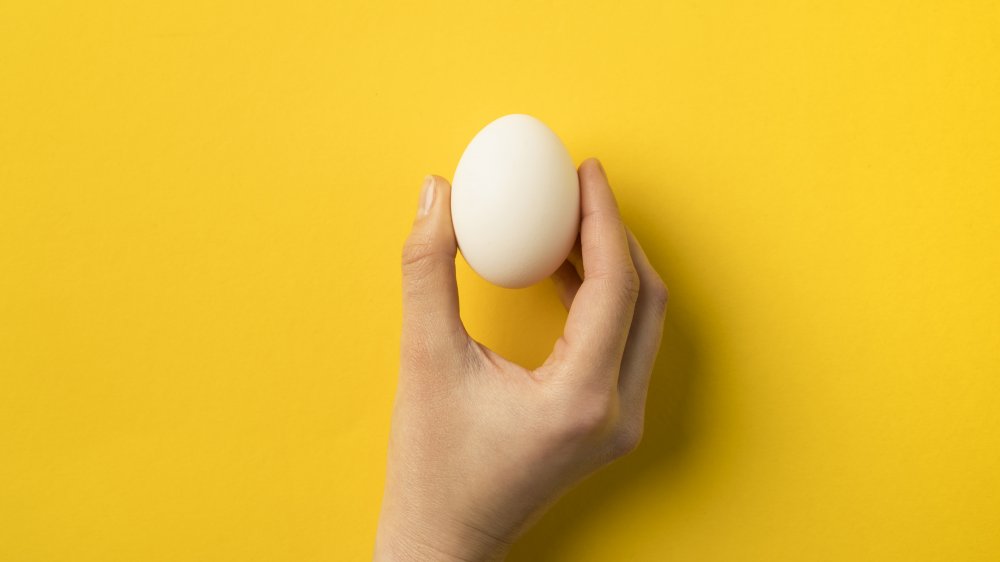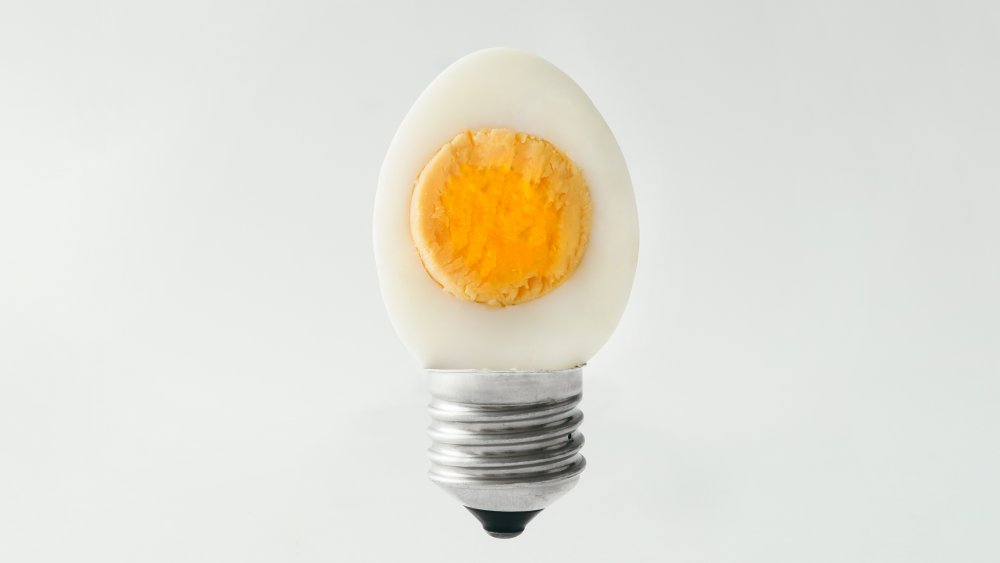
When it comes to nutritional value, eating eggs can pack a powerful punch that’s hard to top. “Along with milk, eggs contain the highest biological value (or gold standard) for protein,” Kathleen M. Zelman, registered dietitian and director of nutrition for WebMD, wrote on the corporation’s site. “One egg has only 75 calories but 7 grams of high-quality protein, 5 grams of fat, and 1.6 grams of saturated fat, along with iron, vitamins, minerals, and carotenoids.” Not only that, but eggs are, according to the expert, “easy to eat, well-tolerated by young and old, adaptable to any meal, and inexpensive.” Eggs are indeed a superfood, but can there be too much of a good, er, super thing? Sort of.
Although Medical News Today reports that “there is not a specific number of eggs a person can eat as part of a healthful diet,” eating between one and three eggs per day is considered to be perfectly safe. In fact, having eggs everyday can have some positive effects on the body. According to the experts, this is what happens to your body when you eat eggs every day.
Eating eggs every day keeps the doctor away

Eggs are chock full of vitamins and minerals, according to Medical News Today — and this is good for the immune system. Vitamins A and B-12, in particular, have been found to boost immune function.
Egg yolk is also a great source of vitamin D, which can both help you avoid getting sick as well as aid your recovery if you do happen to catch something. “When you’re recovering from a cold or flu and don’t have much energy, eggs are probably about the easiest and fastest food to whip together,” Frances Largeman-Roth, a registered dietitian nutritionist, explained in an article for NBC Today.
Eating eggs can also help supply you with two vital minerals for immune health: zinc, which “keeps your immune system kicking,” according to to Largeman-Roth, and selenium. Medical News Today explained that selenium is “an essential trace mineral that is important for many bodily processes, including cognitive function, a healthy immune system, and fertility in both men and women.”
You may get a boost in brain health if you eat eggs often

The vitamins in eggs aren’t just important for strengthening the immune system — they’re also essential for brain health. According to Healthline, an egg contains not one, not two, not three, but four nutrients that are known to boost brain health: vitamin B6, vitamin B12, folate, and choline. B12 is “involved in synthesizing brain chemicals and regulating sugar levels in the brain” and B vitamins have been found to “slow the progression of mental decline in the elderly,” the publication cited.
Folate is also a vital nutrient because deficiencies in this vitamin have been found in people with depression (note: these are depression systems you need to know about) and elderly patients with dementia. Lastly, choline is “an important micronutrient that your body uses to create acetylcholine, a neurotransmitter that helps regulate mood and memory.”
Despite the role choline plays in brain health, many people don’t actually consume enough of it. However, egg yolks are “among the most concentrated sources of this nutrient,” according to the publication. On average, one egg contains 26 percent of a woman’s recommended daily value of choline. Time to start eating eggs!
Your inflammation levels may lower when you eat eggs every day

If you battle chronic inflammation, eating an anti-inflammatory diet can help. Eating a diet that is rich in vegetables, fish, seeds, nuts, fruits, and healthy oils can not only reduce symptoms associated with inflammation but, according to Very Well Health, can also reduce the risk of developing an inflammation-related disease. Foods that contain antioxidants and omega-3 fatty acids are especially helpful in reducing inflammation.
Although eggs are not generally thought of as an antioxidant-rich food, a study in 2011 revealed that they do, indeed, contain “antioxidant properties.” When eggs are cooked, they lose about half of these properties, but they’ll still retain enough to matter. “It’s a big reduction, but it still leaves eggs equal to apples in their antioxidant value,” Jianping Wu, one of the experts behind the study and a professor at the University of Alberta’s department of agricultural food and nutritional science in Canada, told ScienceDaily. In addition to their antioxidant properties, eggs are an omega-3 fortified food, making eating eggs a good decision for those following an anti-inflammatory diet.
Eating eggs every day won’t increase your risk of having a heart attack

Eating eggs — specifically the yolks — was once thought to raise LDL (“bad”) cholesterol levels. Because high cholesterol can lead to heart disease, many chose to avoid cholesterol-containing foods. For some, that meant staying away from eggs altogether or skipping the yolks and opting for egg whites only.
However, Anthony Komaroff, professor of medicine at Harvard Medical School, explained in a letter that research has since proven that “most of the cholesterol in our body is made by our liver — it doesn’t come from cholesterol we eat.” He explained, “The liver is stimulated to make cholesterol primarily by saturated fat and trans fat in our diet, not dietary cholesterol.” Although it’s true that a large egg, on average, contains 1.5 grams of saturated fat, studies have shown that not only does moderate egg consumption not increase a person’s risk of developing heart disease, but the almighty egg may even protect against it.
That said, you should watch what you eat alongside your eggs. “The saturated fat in butter, cheese, bacon, sausage, muffins, or scones, for example, raises your blood cholesterol much more than the cholesterol in your egg,” Komaroff wrote.
Your “good” cholesterol will likely raise if you eat eggs most days
Shutterstock
While high levels of LDL or “bad” cholesterol can lead to cardiovascular problems, having a higher level of HDL (aka “good”) cholesterol is, well, a good thing. According to the Mayo Clinic, “HDL picks up excess cholesterol in your blood and takes it back to your liver where it’s broken down and removed from your body.” Both men and women should aim to raise their good cholesterol to 60 milligrams per deciliter. This can be done in a variety of ways, including exercising on a regular basis, quitting smoking, and eating foods that have been proven to raise HDL cholesterol levels.
Despite eggs’ ol’ reputation of being bad for the body because of its cholesterol content, several studies have proven that eating eggs will actually raise your good cholesterol while having a nominal effect, if any, on your bad cholesterol levels.
Eating eggs can help make your skin healthier

Egg white masks are not a good idea due to the risk of contracting salmonella, which is a bummer for those who like the way your skin feels after this homemade facial. But the good news is eating eggs — cooked eggs, that is — can actually be even more beneficial to your skin.
“Some vitamins and minerals in eggs help promote healthy skin and prevent the breakdown of body tissues,” Medical News Today noted. Selenium, in particular, is great at this. Citing several studies, registered nutritionist Jo Lewin wrote for BBC Good Food that “a selenium-rich diet can help to protect against skin cancer, sun damage and age spots.” Luckily, two large eggs contain 56 percent of your recommended daily value of selenium.
As explained earlier, selenium boosts the immune system and, as Medical News Today explained, “a strong immune system also helps a person look and feel well.” Of course, that doesn’t mean you should only eat a diet consisting of eggs. “To experience the health benefits of eggs,” the publication explained, “a person should eat them as part of a balanced diet.” So, you know, don’t go putting all your eggs in one basket…
Eating eggs every day will keep you feeling fuller longer

When deciding between scrambled eggs and a bagel for breakfast, you may pick the latter, thinking it’ll keep you feeling fuller longer. But science says that’s not the case. No, seriously. Scientists compared these two breakfasts and found a clear winner.
In a study conducted by the department of psychology at Saint Louis University in Missouri, participants who were classified as “overweight” or “obese” fasted overnight. The next morning, the subject ate “either an [equal-weight] egg or bagel-based breakfast followed by lunch [three and a half hours] later, in random order two weeks apart.”
In the end, the researchers found that eating eggs for breakfast “induced greater satiety and significantly reduced short-term food intake.” Yes, the incredible egg beats the bagel on the fullness scale. How? “Eggs are a perfect combination of protein and fat,” Julie Kaye, a New York City-based registered dietitian explained to Woman’s Day, “so they’re more satisfying than other breakfast foods.”
If you eat eggs every day, you may lose weight

As a study by Saint Louis University’s department of psychology concluded, eggs were found to reduce “short-term food intake.” The stellar combo of protein and fat makes eggs more satiating and, in turn, reduces the urge to keep eating. And fewer meals equals — you guessed it — weight loss.
In another study comparing bagels and eggs — because you can never have too many, right? — researchers found that people who ate eggs as opposed to bagels over an eight-week timeframe experienced a 16 percent greater reduction in body fat percentage, 34 percent greater reduction in waist size, 61 percent greater reduction in body mass index (BMI), and a 65 percent greater reduction in overall weight loss. The results were clear: Eating eggs enhances weight loss.
When you eat eggs also matters. Lauren Harris-Pincus, a registered dietitian nutritionist, told The Healthy that consuming “adequate protein at breakfast (at least 20 grams)” — like eggs — is important to “keep you satisfied all morning, control cravings, support muscle mass and metabolism, and decrease snacking later.”
Eating eggs every day will give you more energy

The protein in eggs does more than help keep you feeling fuller longer, it also gives you energy. A review of over 25 studies on eggs conducted and published by nutrition professors Donald K. Layman and Nancy R. Rodriguez in Nutrition Today (via Medical News Today) determined that eggs are a great source of sustained energy. This is, in part, because the protein in eggs do not cause blood sugar or insulin to spike. Instead, it supplies a steady flow of energy. The vitamins in eggs are also thought to aid in energy production.
In addition to providing and sustaining energy, eggs contains the amino acid leucine, which helps the body utilize the energy provided by protein as well as build and maintain muscle. All things considered, the study’s authors concluded, “Our review of the science suggests that eggs are an ideal protein choice, plus, they are very affordable.”
The idea of eating eggs every day sounds better and better, doesn’t it?
Strengthen your nails and hair by eating eggs

If you buy shampoos and conditioners fortified with biotin, you may be surprised to learn that eating eggs — specifically the yolks — can actually be an easy way to further increase your biotin intake. “Biotin, a B-complex vitamin, may play a role in the development of keratin,” Joshua Zeichner, director of cosmetic and clinical research in the department of dermatology at Mount Sinai Hospital in New York City, explained to Health. “Since both hair and nails are made of keratin, through a similar process in the body, it’s thought that nutrients that help one can also help the other,” he revealed.
As highlighted above, eggs also contain vitamin B12, protein, zinc — not to mention iron. These are all nutrients you want for healthy hair. “Hair thrives on protein, iron, zinc, and vitamin B12,” dermatologist Dendy Engelman told PopSugar, adding, “These nutrients help support hair structure, growth, breakdown carbs and fats, moisturize the scalp, and distribute oxygen to the cells.” Yes, this power food will have your hair and nails looking eggcellent in no time (sorry, not sorry).
Reduce your stress and anxiety by eating eggs every day

While you may not be as familiar with lysine as you are with biotin, this essential amino acid found in eggs has some pretty incredible health benefits. According to one study, it appears to reduce long-term anxiety and acute stress. Zinc, which is also found in eggs, has also “been linked to lowered anxiety,” according to Harvard Health Publishing.
In addition curbing anxiety, Healthline revealed that lysine can suppress herpes outbreaks, improve glucose responses in diabetics, and even lower blood pressure. “It may also improve your health overall by helping your body produce collagen, digestive enzymes, antibodies, and protein hormones,” the publication noted. Although lysine supplements are available, Healthline recommends getting your lysine “naturally, from foods” whenever possible. In addition to eggs, lysine can be found in dairy products like yogurt, cheese, butter, and milk as well as meat and seafood.
Eating eggs every day can improve your eye health

Carrots and dark greens have earned a reputation for improving eyesight, but they’re not the only foods that can boost your eye health. “We all know that leafy green vegetables are high in lutein, but eggs are another good source,” Erin Dummert, dietitian and owner of Madam Nutrition in Whitefish Bay, Wis., revealed in an interview with Today’s Dietitian. “While they comparatively have a smaller amount [than leafy greens], a new study shows that they are more bioavailable. That means that even though there is a smaller amount of lutein in eggs, it goes directly into the bloodstream.”
Dummert is thankful that studies are now proving the benefits of eating eggs — and not just to the eyes, but the body as a whole. “I think there are still a lot of people out there who are afraid of eating eggs after so many years of talking about them in terms of cholesterol concerns,” she revealed. “So sharing this research gives them another healthy reason to start eating more eggs.”
You may improve your liver health by eating eggs

“According to the American Liver Foundation, there are no medical treatments — yet — for non-alcoholic fatty liver disease,” Annie Guinane, registered dietitian and nutritionist at the University of Chicago’s Metabolic and Fatty Liver Disease Clinic, revealed in an interview with the university.
However, there are ways to “prevent liver damage from starting or reversing it once it’s in the early stages,” Guinane added. Making diet changes is one of the best ways to do this. “We recommend patients with non-alcoholic fatty liver disease drink three cups of coffee per day, eat four tablespoons of olive oil a day and follow a Mediterranean diet, which emphasizes eating primarily plant-based foods and healthy fats,” the expert revealed. This may not sound like traditional diet advice, but Guinane explained that the Mediterranean diet is balanced and calls for “more fruits and veggies, more whole grains, more nuts and legumes, lean meats, less red meat and less sweets/added sugars.”
Eating eggs, in particular, is helpful to the liver. One study conducted by researchers in 2014 found that an increased intake of choline, which is found in eggs, can lower a person’s risk of developing this incurable liver disease.
Eating eggs every day can strengthen your bones and teeth

You’ve heard of drinking milk for strong bones, but what about eating eggs? Heathline revealed that egg yolks contain a substantial amount of vitamin D, which can improve bone health. It’s true. Eggs are also “surprisingly good for teeth,” according to Jefferson Dental Clinics, because they contain phosphorus, vitamin K, and vitamin D.
But those aren’t the only nutrients that make eggs a superfood for the teeth. The high-protein content also helps. “Proteins are vital for the formation and maintenance of the tooth structure,” dentist Akshima Sahi revealed in an article for News Medical. “They also protect the mucosa and the connective tissue lining the oral cavity, and contribute towards a healthy immune system.” And, if that weren’t enough, eggs also contain vitamin A, which Sahi revealed is also “essential in maintaining the mucosal lining and connective tissues supporting the teeth.” The more you know.
Adapted from : https://www.thelist.com